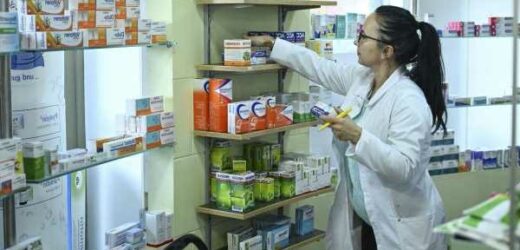Vaccine: Dr Chris Smith says ‘all medicines have a side effect’
We use your sign-up to provide content in ways you’ve consented to and to improve our understanding of you. This may include adverts from us and 3rd parties based on our understanding. You can unsubscribe at any time. More info
There are 19 medicines and drugs being used as emergency alternatives due to a serious of treatments that patients are normally prescribed amid a major crisis of emergency care in the NHS. When there is a serious shortage of a specific medicine or appliance, then the Department of Health and Social Care (DHSC) may issue what is known as a serious shortage protocol (SSP). According to a list on the NHS’ Business Service Authority (NHSBSA) website, there are currently 19 drugs with an active SSP.
Patients can be still be treated for their sickness or illness, however, as SSPs allow GPs to prescribe other emergency alternatives.
According the NHS, a contractor needs to use their professional skill and judgement to decide, with the help of medical experts, to decide whether it’s appropriate to swap a patient’s prescribed order for the active SSP.
Last month, the DHSC initially issued an SSP for three penicillin medicines after demand for antibiotics used to treat Strep A soared following a surge in cases.
But after 19 children died from the lethal virus, the DHSC issued five more SSPs to cope with antibiotic supply problems as cases and demand continued to soar.


It allowed pharmacists to supply an alternative forms of penicillin make things smoother for patients and GPs.
The DHSC said in a statement: “Demand for penicillin has risen recently as it is used to treat Strep A and scarlet fever, and the increased demand means that some pharmacists are experiencing temporary and localised supply issues and may not have the specific formulation listed on the prescription.”
The SSPs appear to remain in place, according to the NHSBSA’s website, implying there is still a serious shortage of the antibiotics normally used to treat Strep A.
But the bacterial infection remains a concern for parents, while Covid and flu cases are also rising. The combination of these three illnesses has added pressure to the already struggling health service, which is now experiencing a major crisis in emergency care.

Last month, one in four ambulance patients in England waited more than an hour to be transferred to hospital A&E teams in December as a combination of bed shortages and boosted demand.
Meanwhile, four in 10 patients had to wait at least 30 minutes to be transported to A&E. This month, multiple hospitals across the country are reporting critical incidents as they struggle to cope with an influx of patients.
Health Secretary Steve Barkley has argued that the pressures on NHS this month can be attributed on “a combination of very high rates of flu, persistent and high levels of COVID, continuing concerns particularly among many parents around Strep A”.
But, these are certainly not the only diseases that patients are worrying about. There are also SSPs issued for certain Atorvastatin prescriptions, a medication used to prevent cardiovascular disease in those at high risk.
As well as this, there are also SSPs issued for specific Fluoxetine prescriptions. This drug is sold under the brand name Prozac and is used as an anti-depressant.
DON’T MISS
Covid can get into the brain, analysis of autopsy samples shows [REPORT]
Scientist’s explanation as to why Covid cases will peak this month [INSIGHT]
Water found on the Moon comes from the solar wind, study concludes [REVEAL]


There are also an SSPs issued for Estradiol treatments, an estrogen steroid hormone and the major female sex hormone.
Aside from the drugs with active SSPs issued, there is also reportedly a shortage of basic cough and cold medicines like throat lozenges, cough mixtures and some painkillers at a time when cases of winter illnesses are soaring, the head of the Association of Independent Multiple Pharmacies (AIMP) warned this week.
Even some of the most basic treatments such as Lemsip and Nightnurse have reportedly been missing from pharmacy shelves they report that “much higher than in years gone by” amid surging Covid and flu cases.
AIMPs CEO Leyla Hannbeck told PA News Agency: “On the front line it is very difficult because we’re seeing these shortages but those people who are in charge of supporting us with it are denying it.”
However, a DHSC spokesperson said: “We are aware of reports of issues with the availability of some branded cold and flu medicines – these appear to be temporary, localised.
“Supply of over-the-counter medicines is not controlled by central government but we are engaging with suppliers to investigate and help ensure that over-the-counter cold and flu medicines remain available.”
Source: Read Full Article


